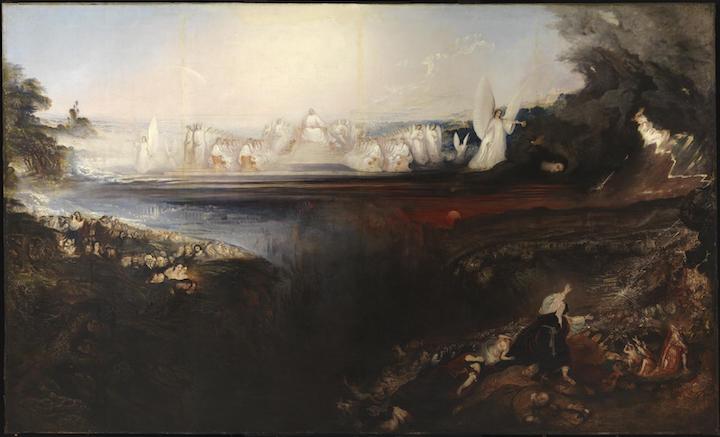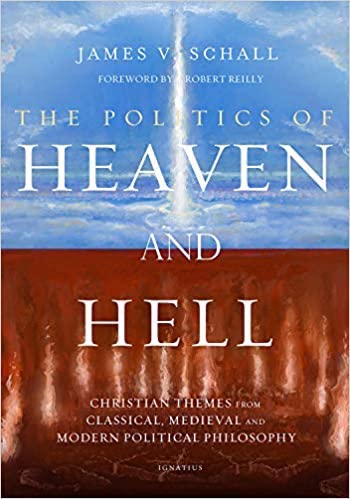Shortly after I arrived in Washington years ago, I reviewed a book with the same title as this column. A friend warned about reviewing books by that particular author – our late lamented colleague James V. Schall, S.J. – because if you start, he said, you won’t have time for anything else. And that was before the supernova of titles that Schall the Great turned out in his seventies, eighties, and even nineties.
Ignatius Press is republishing The Politics of Heaven and Hell this fall with an introduction by another incisive and prolific writer, Robert Reilly. A good thing, too, because in our current chaos, when it seems almost impossible to get sure footing about anything, this relatively neglected volume not only uncovers sure foundations. It explains the ways by which we’ve mixed up eternal and temporal things – and put the times out of joint.
Schall’s central insight is that our classic traditions of both faith and reason agree that politics is an important, but circumscribed realm. If we were the highest beings, politics would be the highest science, said Aristotle. That wise pagan – Dante calls him “the master of those who know” – knew that we are not the highest beings. There’s God, for starters, and His Creation, to which we owe deference. Ignore them, and the inevitable result is chaos, suffering, servitude, tyranny, and death.
The ancient Hebrews learned this well before Aristotle. Schall notes how little attention political theorists pay to the Old Testament, the history of a small and obscure nation – Israel – that survived, improbably, down to our own time, with incalculable influence on the history of the whole world. It did so not because of any special policies or virtues: Jewish history is a record of graces given and refused, of return and consequent flourishing, of many rounds of ignoring God, decline, and renewal through Him.
The overall lesson: nations are great not because they accumulate power or wealth. Power and wealth come and go. And aren’t all they seem anyway. Nations are made great, however insignificant they may be in earthly terms, because God makes them so and they stay faithful to their Maker.
Christianity, of course, limited politics in a special way, beginning with Jesus’ famous distinction between the things that are Caesar’s – the arrangements necessary to human flourishing (even, sadly, taxes) – and the things that are God’s. Those few words had immense, cascading effects in the Christian tradition.
And not only in thinkers like Augustine, Aquinas, Suárez, Bellarmine, etc. Countries historically touched by Christianity still mostly protect beliefs about ultimate things from control by politics – indeed, believe that right can and should challenge might. That separation is absent from Muslim societies, ideological regimes like China, or traditional societies where the ruler is regarded as a kind of mortal god.

But it’s not only on high intellectual or social planes that these truths prove themselves. As we’ve seen only too clearly in modern times, when politics becomes the “highest science” men become not philosopher kings, but beasts. The totalizing political systems of Communism, Nazism, and Fascism were killing machines on an unprecedented scale.
And recent decades have given birth to what the Polish philosopher Ryszard Legutko calls the “demon in democracy,” a new totalitarian temptation wherein everything is defined by political ideology. We worry over “polarization,” but there’s a deep geological fault in our politics, far more radical than that. The absence of religion in the public square, with its moderating effects, is a large factor in this development, since once the true God departs the false god of the state arrives.
Even good public impulses then become poisonous – and unlimited. For example, we’ve just seen what can happen when a proper effort to right racism, a historic wrong, is made the measure of everything. Everything becomes “racist” that is not explicitly “anti-racist” – according to someone’s definition, which may differ from someone else’s. Not surprisingly, demands for absolute political justice then turn into “canceling” and anathematizing people who show the slightest deviation from an ideological line – i.e., injustice.
Historic racial inequities need to be fixed, but does injustice only involve race – with occasional bows to gender and class? Andrew Sullivan, a brilliant writer, recently resigned from New York magazine because it couldn’t bear his criticism of “cancel culture,” despite his being gay and liberal on some issues, conservative on others (and somehow also aspiring to be Catholic).
He pointed out that it’s places like the New York Times that really don’t understand a just “diversity.” The Times seems poised to cave in to employee demands that staff reflect the racial makeup of New York City: 24 percent black and more than half “people of color.” And there must be “sensitivity training” – i.e., ideological indoctrination – for everyone.
Sullivan notes that there are other underrepresented groups at the Times. Only 37 percent of New Yorkers, for example, are college graduates – who are overrepresented in the newsroom – as are Asians and Jews. Should some of them resign? If you wanted fairer proportions of New Yorkers, 10 percent of staff would have to be Republicans, 6 percent Hasidic Jews, and 33 percent Catholic.
It may be a long wait for that because ideologues only care about certain “facts” and rarely have a sense of irony – or humor.
Which takes us back to the politics of Heaven and Hell. Heaven is in Heaven and the New Jerusalem cannot be brought to Earth by our efforts; only God will bring perfect justice at the Second Coming. The road to human hells, however, always lies wide open.
The larger perspective that religion affords us – including elements like human imperfection, sin, forgiveness, tolerance, the limits of earthly politics – does not mean that we need to be any less passionate in pursuing justice and fairness. But it does mean we have to be vigilant and measured about our own motives and the results of our actions. We have it on good authority: “Therefore take heed that the light which is in you is not darkness.” (Lk. 11:3)
*Image: The Last Judgment by John Martin, 1851-53 [The Tate, London]
















